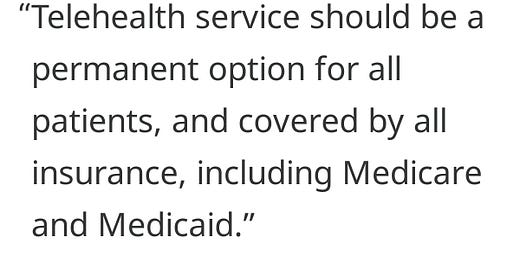Congress needs to ensure telehealth access continues for Medicare patients.
Write your reps now.
Congress needs to ensure telehealth access continues for patients.
Telehealth for Medicare is going to expire at the end of December 2024. Private insurers tend to follow Medicare on things like this. So this can and will affect everyone’s ability to get telehealth services.
It will force disabled, terminal, high risk, immunocompromised, into in-person visits for things that absolutely don’t require in-person exams. They will force terminally ill and high risk and immunocompromised people to get mental health services in person. This will shut out many rural patients who have trouble traveling for appointments, and need telehealth access.
This will also lead to patients with highly contagious diseases such as covid to be forced to go into the doctors offices at the same time you’re there for preventative or chronic illness care. Bonus, most of these healthcare providers do not require masks at all, and may never do so again for many years as we slide backwards, no matter how bad things get, or how many serious diseases circulate. The best hope for many people is protecting access to telehealth.
✏️ My letter to reps (congressperson and us senators):
Telehealth services via Medicare must not expire. Telehealth service should be a permanent option for all patients, and covered by all insurance, including Medicare and Medicaid.
Please feel free to repurpose for your own letters to reps.
MarketWatch - 67 million Medicare recipients face ‘chaos’ if Congress cuts telehealth benefits Elderly and disabled patients could miss out on healthcare services unless an extension is passed before the end of the year By Jessica Hall Last Updated: Sept. 25, 2024 Medicare beneficiaries’ access to telehealth services will expire at the end of the year unless Congress acts, and public-health experts say that doing away with video-enabled medical care would lead to “chaos” in the healthcare system relied on by 67.4 million Americans. About 5% of Medicare’s overall outpatient visits are currently conducted via telehealth, according to Ateev Mehrotra, a professor at Brown University’s School of Public Health. Telehealth usage was as high as 42% during the height of the COVID-19 pandemic, he added. The types of medical appointments carried out via telehealth include mental-health visits, dermatological screenings and conversations with a primary-care doctor about cold or flu symptoms or about getting physical therapy. “If the rules were to expire, many people would be devastated. People are going to be frantic,” Mehrotra told MarketWatch in an interview. “Anxiety is increasing by the day because the year-end is approaching and Congress hasn’t passed these extensions.”
American Physical Therapy Association - Congress Must Act on Telehealth Flexibility Before Provisions Expire - Without action, PTs and PTAs will no longer be eligible for the provisions that have allowed them to be paid for telehealth services. Date: Friday, November 22, 2024 For PTs, PTAs, and their Medicare patients, extension of these telehealth flexibilities is critical to maintaining continuity of care. To that end, APTA and other therapy provider associations are urging Congress to extend the pandemic-era Medicare telehealth policies. We need your help in these advocacy efforts: Ask your members of Congress to pass a year-end legislative package and support extending telehealth via APTA's Patient Action Center.
KFF - What to Know About Medicare Coverage of Telehealth - Alex Cottrill, Juliette Cubanski, and Tricia Neuman - Published: Oct 02, 2024 Prior to the declaration of the COVID-19 public health emergency, Medicare coverage of telehealth was largely restricted to beneficiaries in rural areas and to certain types of providers, facilities, and services. At the time, beneficiaries were typically required to travel from their homes to approved clinical sites where they could receive care from providers at other locations. To make it easier and safer for beneficiaries to seek medical care during the pandemic, the Secretary of the Department of Health and Human Services (HHS) waived many of these restrictions in March 2020, enabling broader use of telehealth services for all Medicare beneficiaries.


